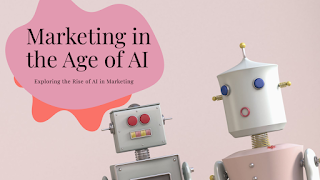The Rise of AI in Marketing: How Artificial Intelligence is Transforming the Industry
In the ever-evolving landscape of marketing, Artificial Intelligence (AI) has emerged as a game-changer, offering unprecedented opportunities for brands to connect with their audience, optimize campaigns, and drive growth. As AI technologies continue to advance, their impact on marketing strategies is becoming increasingly profound. This blog explores how AI is transforming the marketing industry and what it means for businesses striving to stay ahead of the curve.
AI in Marketing: An Overview
Artificial Intelligence in marketing refers to the use of machine learning algorithms, data analytics, and automation to improve the efficiency and effectiveness of marketing efforts. From predictive analytics and customer segmentation to chatbots and personalized recommendations, AI is revolutionizing how marketers understand and engage with their audience.
Key Areas Where AI is Making a Difference
Predictive Analytics
- Forecasting Trends: AI-powered predictive analytics tools can analyze vast amounts of data to identify patterns and predict future trends. This helps marketers anticipate market changes and adjust their strategies accordingly.
- Customer Insights: By analyzing customer behavior and preferences, AI can provide deep insights into customer needs and predict future actions. This enables more accurate targeting and personalized marketing campaigns.
Personalization
- Dynamic Content: AI allows for the creation of dynamic content that changes based on the user’s behavior, preferences, and past interactions. This level of personalization enhances user experience and increases engagement.
- Recommendation Engines: AI-driven recommendation engines analyze user data to suggest products or content tailored to individual preferences, boosting conversion rates and customer satisfaction.
Chatbots and Virtual Assistants
- 24/7 Customer Support: AI-powered chatbots provide instant, round-the-clock customer support, addressing queries and resolving issues in real-time. This improves customer experience and frees up human resources for more complex tasks.
- Lead Generation: Chatbots can engage with website visitors, collect contact information, and qualify leads, streamlining the lead generation process.
Content Creation and Optimization
- Automated Content Generation: AI tools can generate content such as product descriptions, social media posts, and even news articles, saving time and ensuring consistency.
- SEO Optimization: AI can analyze keywords, user intent, and search engine algorithms to optimize content for better search engine rankings, driving more organic traffic to websites.
Programmatic Advertising
- Real-Time Bidding: AI enables real-time bidding in programmatic advertising, allowing marketers to bid for ad space based on user data and behavior. This ensures ads are shown to the right audience at the right time, maximizing ROI.
- Ad Targeting: AI can analyze vast amounts of data to identify the most relevant audience segments for ad campaigns, improving targeting accuracy and campaign effectiveness.
Challenges and Considerations
While AI offers significant benefits, it also presents challenges that marketers must navigate:
- Data Privacy: With increasing concerns over data privacy, marketers must ensure they handle customer data responsibly and comply with regulations like GDPR.
- Integration: Implementing AI technologies requires seamless integration with existing systems and workflows, which can be complex and resource-intensive.
- Skills Gap: The adoption of AI in marketing necessitates new skills and expertise, highlighting the need for ongoing training and education for marketing professionals.
My View on AI in Marketing
AI is not just a passing trend but a fundamental shift in how marketing will be conducted. The ability of AI to analyze vast datasets, predict customer behavior, and automate complex processes offers unparalleled advantages that can drive significant growth for businesses willing to embrace it. However, marketers must approach AI with a strategic mindset, focusing on ethical considerations, continuous learning, and seamless integration into existing systems.
The businesses that will thrive in this AI-driven landscape view AI as a tool to enhance human creativity and decision-making rather than a replacement for human intelligence. By balancing the power of AI with a deep understanding of customer needs and a commitment to ethical practices, marketers can create more meaningful, personalized, and effective campaigns.

Comments
Post a Comment